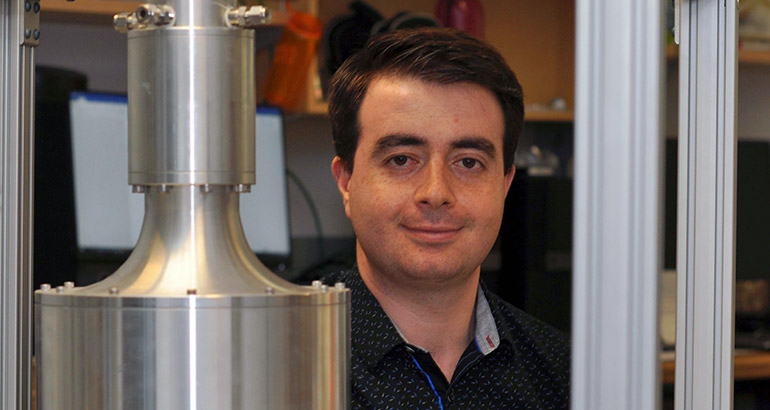
Doctoral student Sajjad Mohammadnejad with a mixed gas burner used by engineering researchers in the Combustion for Propulsion and Power Laboratory at UBC Okanagan.
UBCO engineers explore improved energy generation
In the search for cleaner and more efficient energy, researchers from UBC and the National Research Council (NRC) of Canada are investigating the benefits of injecting hydrogen into natural gas distribution networks.
The goal is to better understand how hydrogen can improve natural gas combustion, making it cleaner and at the same time a more efficient fuel, explains Sina Kheirkhah, an assistant professor and researcher with the Combustion for Propulsion and Power Laboratory in UBC Okanagan’s School of Engineering.
The work, he says, it isn’t without challenges.
“Turbulent combustion is a complex field of science and engineering,” says Kheirkhah. “Many basic principles related to turbulent premixed combustion are not firmly established. After several decades of combustion research, we are still trying to understand how fast premixed flames burn.”
Working collaboratively with the NRC’s gas turbine laboratory and using laser-based diagnostics, Kheirkhah and his team are performing measurements to delve into the heart of gas turbine engine combustors.
The eventual goal is to have better and more accurate tools for estimating the burning rate in combustion equipment. Through a number of experiments, they have shown that some of the conventionally accepted approaches for estimating premixed flame burning rates may need to be rethought.
“This is important since future development of gas turbine engine combustors requires a clear and accurate understanding of how quickly things burn,” says Kheirkhah.
This research, targeted towards combustion scientists and engineers, aims to improve their understanding of how hydrogen-enriched natural gas burns. The researchers are also examining how, or if, hydrogen-enrichment of natural gas will improve energy generation from these engines.
“We are developing knowledge regarding combustion of cleaner fuels, such as hydrogen-enriched natural gas. Combustion of the cleaner fuels will reduce emission of carbon-based material, helping with the deceleration of global warming and climate change,” he explains.
Kheirkhah’s research was published in the latest edition of Combustion and Flame. The research was funded in part by Fortis BC and Mitacs along with in-kind and intellectual contributions from the National Research Council of Canada’s Gas Turbine Laboratory.
About UBC’s Okanagan campus
UBC’s Okanagan campus is an innovative hub for research and learning in the heart of British Columbia’s stunning Okanagan Valley. Ranked among the top 20 public universities in the world, UBC is home to bold thinking and discoveries that make a difference. Established in 2005, the Okanagan campus combines a globally recognized UBC education with a tight-knit and entrepreneurial community that welcomes students and faculty from around the world.
To find out more, visit: ok.ubc.ca.